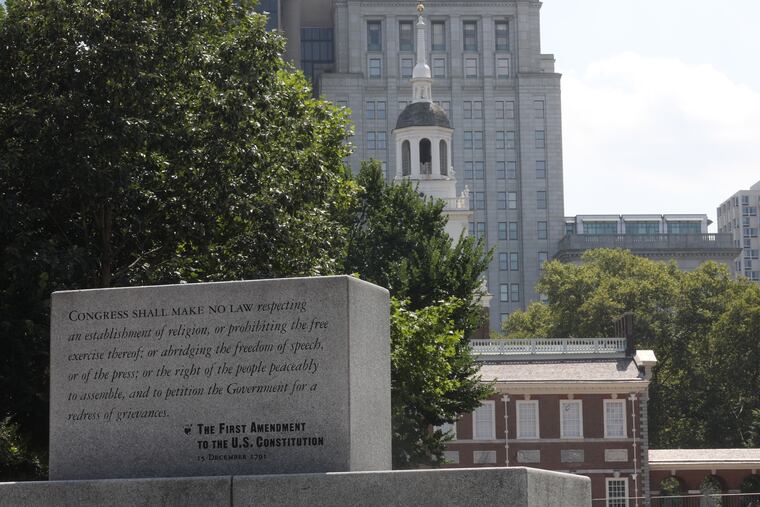Money in politics might seem distasteful, but the First Amendment protects it | Opinion
When it comes to campaign spending, we should leave the First Amendment alone.

Since the ratification of the Bill of Rights in 1791, 17 additional amendments have been added to the U.S. Constitution. None of them sought to limit the scope of the First Amendment's protection of freedom of speech and press, as interpreted by the Supreme Court.
The result has been that the U.S. offers — sometimes controversially — more legal protection for disturbing and sometimes loathsome speech than anywhere else in the world. Armed Nazis march in Charlottesville carrying flags emblazoned with swastikas and chanting fascist slurs; religious zealots stand as close as they are permitted to churches, as services proceed honoring American soldiers who die in combat, carrying placards that denounce the soldiers as well as all gay Americans; filmmakers create crush videos for sale that show dogs savagely fighting each other to the death and women wearing stiletto heels stepping on and killing kittens and other small animals. All receive First Amendment protection.
>> COUNTERPOINT: America needs a 28th Amendment for more liberty, more representation and better government | Opinion
Constitutional amendments have now been proposed to limit the amounts of money that may be contributed to or spent on elections. The amounts that may be contributed to candidates, the Supreme Court has held, may already be regulated; the amounts that may be spent independently of candidates may not be. The latter result was reached in two cases, the first relating to expenditures by individuals and the second (the famous, and some think infamous, Citizens United case) with respect to corporations.
Shall we adopt an amendment that limits the First Amendment right of all to participate in the political process by empowering Congress to limit the amounts spent in doing so? When a constitutional amendment was considered by Congress in 1997, Sen. Ted Kennedy opposed it, saying that "in the entire history of the Constitution, we have never amended the Bill of Rights, and now is no time to start."
More recently, Chief Justice John Roberts went further. "Money in politics," he wrote, "may seem at times repugnant to some, but so too does much of what the First Amendment vigorously protects. If the First Amendment protects flag burning, funeral protests, and Nazi parades — despite the profound offense such spectacles cause — it surely protects political campaign speech despite popular opposition."
I would go further. The First Amendment is rooted in the notion that government simply cannot be trusted when it engages in the process of deciding how much speech as well as what speech may be permitted. We see every day the impact of gerrymandering by state legislatures when they are empowered to define the boundaries of electoral districts and then do not make the slightest effort to do so fairly but only to aid the party then in power. Would you trust those same legislators to decide how much speech about elections is "reasonable" — a word used in a number of the proposed constitutional amendments? I wouldn't and don't.
One interest that can be accomplished by legislation is that of more public knowledge of the identity of larger contributors and spenders of money in the political sphere. Much is already disclosed. The identity of individuals and corporations who contribute to so-called super PACs — entities that spend money they have raised to support candidates — and the amount contributed by each is publicly disclosed. As a result, we not only know that far more of that money comes from individuals than corporations but also who they are and how much they contributed. There remains, however, a significant lack of public information about the sources of "dark money" that is spent in electoral campaigns by supposedly charitable entities. That is a reality that can be dealt with either by legislation or changes in policy by the Internal Revenue Service.
More broadly, those who seek a constitutional amendment are correct about one significant reality. There is vast income disparity in the nation and on every level that inevitably favors the wealthy. What need not follow from that, however, is that a wise response is to limit the amount of speech in political campaigns, including speech that advocates changes in our society, legislative and otherwise, to deal with the problem. Economic issues require economic solutions, not speech-limiting ones.
We should leave the First Amendment alone.
Floyd Abrams is the author of "The Soul of the First Amendment." (Yale U. Press 2017)
Floyd Abrams will be among the panelists discussing "Should We Amend the Constitution to Authorize Political Spending Limits?" at 6:30 p.m. Monday at the National Constitution Center.